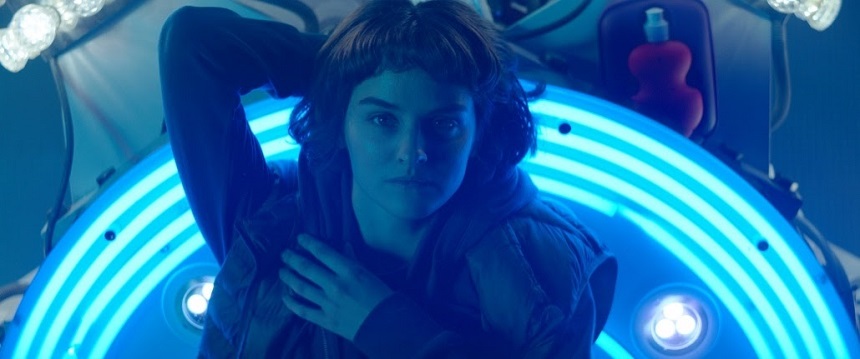Lund Fantastic 2020 Review: JUMBO, We So Seldom Look on Love
Noémie Merlant stars as a girl whose object of desire is, well, an object

How do we know when we love? How do we know what we love? How do we make the decision (and it is a decision) that we will love what we love, for as long as we are allowed? And what do we do if that love is rejected by the society in which we live? While many countries and societies are finally more accepting of loves outside the heteronormative, anything that doesn't fit into 'one man-one woman-monogamy-for-life' is still viewed as strange, and even those who consider themselves open-minded might discover that they have limits to what they consider love.
Zoé Wittock's feature debut tells the tale of a shy and awkward young woman, who finds herself drawn into something beyond what we might consider reasonable or even possible. Is it dangerous? Is it sinful? Is she insane? Jumbo is a quiet, beautiful, and very strange story of an unusual kind of love.
Jeanne (Noémie Merlant, Portrait of a Lady on Fire) has recently started a job a seasonal job at the local amusement park, working the overnight janitor shift. She is painfull shy, having no friends other than her flamboyant, somewhat skanky, but loving mother Margarette (Emmanuelle Bercot, Mon Roi). She's always been fascinated by the various rides at the park, and has built her own minuature, artistic versions in her bedroom. One night, Jeanne is cleaning the new ride, a tilt-a-whirl, when it seems to rescue her from a fall, despite being powered-down. Is Jumbo (as Jeanne calls it) alive and sentient? And is it as enamoured of her as she is becoming of it?
From the moment Jeanne uses her spit to clean one of his bulbs, it seems that she makes a connection. Certainly Jumbo is an thing of beauty: with its coloured lights, spinning mechanisms, and warm oils, all that can delight, soothe, mesmerize, and indeed, arouse Jeanne, who is she to question that this truly is love? It does have a fairy-tale appeal - the young mousy girl being seen as a princess by her handsome prince; so what if he's a amusement park ride? Wittock briefly introduces possible reasons why Jeanne might 'suffer' from objectivism (the official psychological term for romantic/sexual love towards objects): an absent father, a house full of objects revered by her mother, lack on interest from boys, her mother's continued infatilization of her grown daughter.
But perhaps, this is just how Jeanne is? Maybe she likes building her miniatures in her room; likes living with her mother; likes working at the amusement park; and yes, loves Jumbo, and finds sexual satisfaction covered in its warm oil. Wittock never belittles Jeanne's feelings; cinematographer Thomas Buelens and composer Thomas Roussel lean into the contemporary fairy tale tone, giving Jeanne and Jumbo's romance all the sweetness and joy of first requited love.
At the heart of the film, though, is the relationship between Jeanne and Margarette. The two could not be more different. Margarette gives off a confidence and swagger, but underneath she's fighting to maintain a reason working-class life for herself and her daughter, and might have finally have found a loving and stable partner. Why wouldn't she want the same for Jeanne? Margarette both wants her daughter to have a boyfriend, but still be allowed to call her 'sugarpuss'; Jeanne wants something more than just her mother in her life, but she doesn't know how to break that bond. It becomes not just about finding the person (or in this case, object) that you want to be with, but about your community accepting your choice.
Wittock passes no judgement on the characters, but instead asks the audience, what would you do if you loved like Jeanne does, or what would you do if you loved someone like Jeanne? Jumbo wears its tilted-whirling-coloured heart on its sleeve, finding joy with the oddest couples, knowing that happiness comes from acceptance of us exactly as we are.







